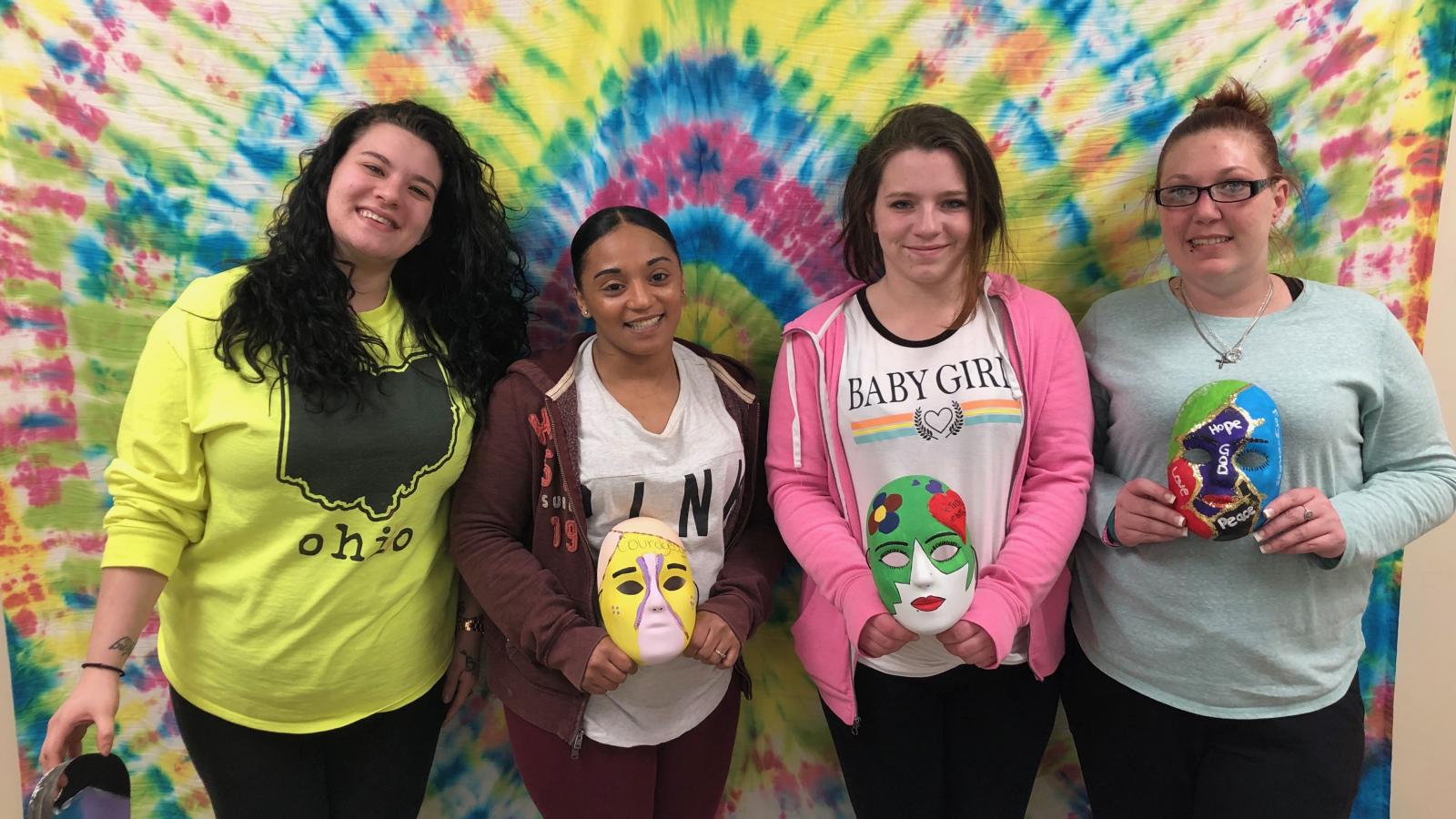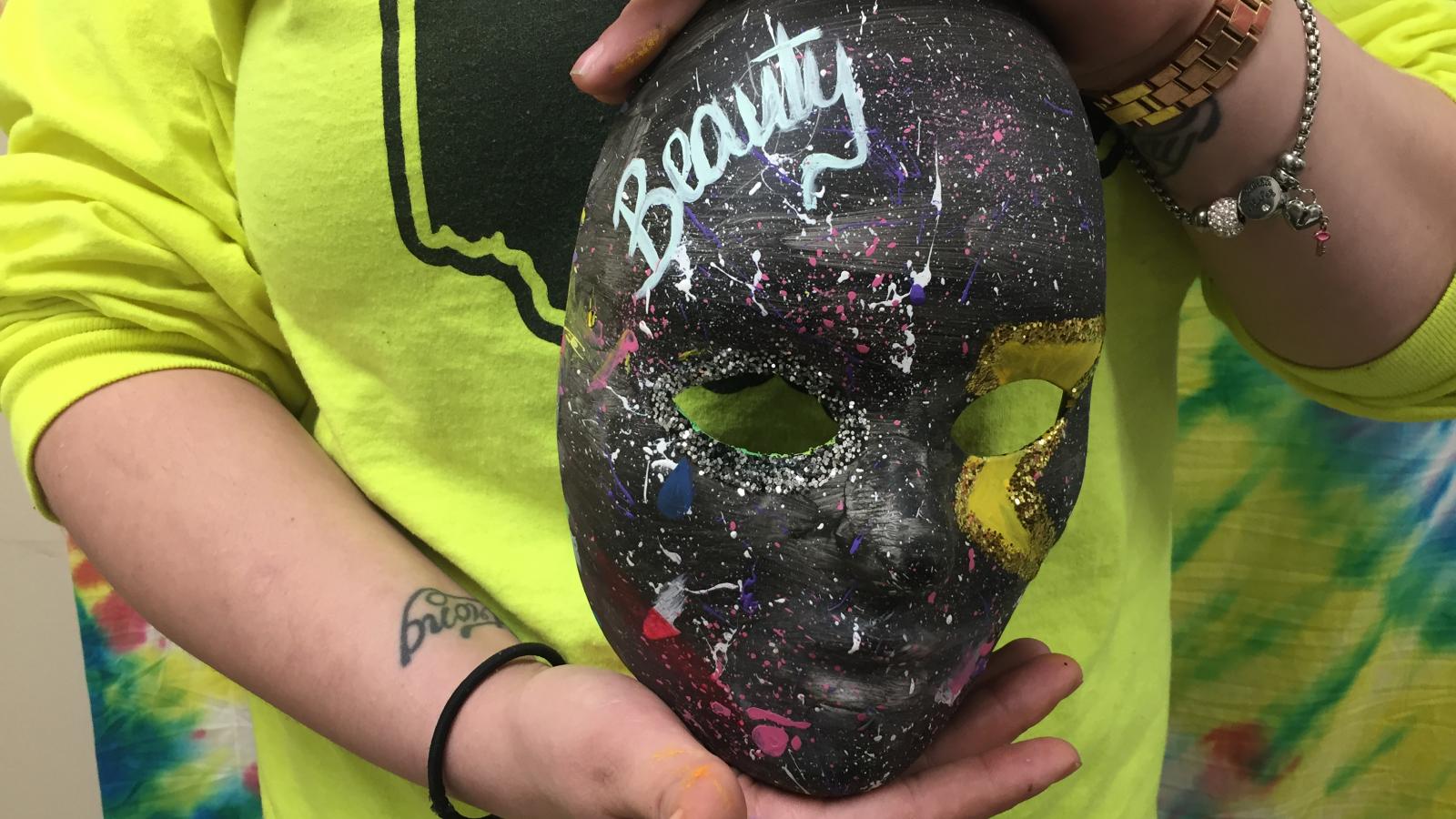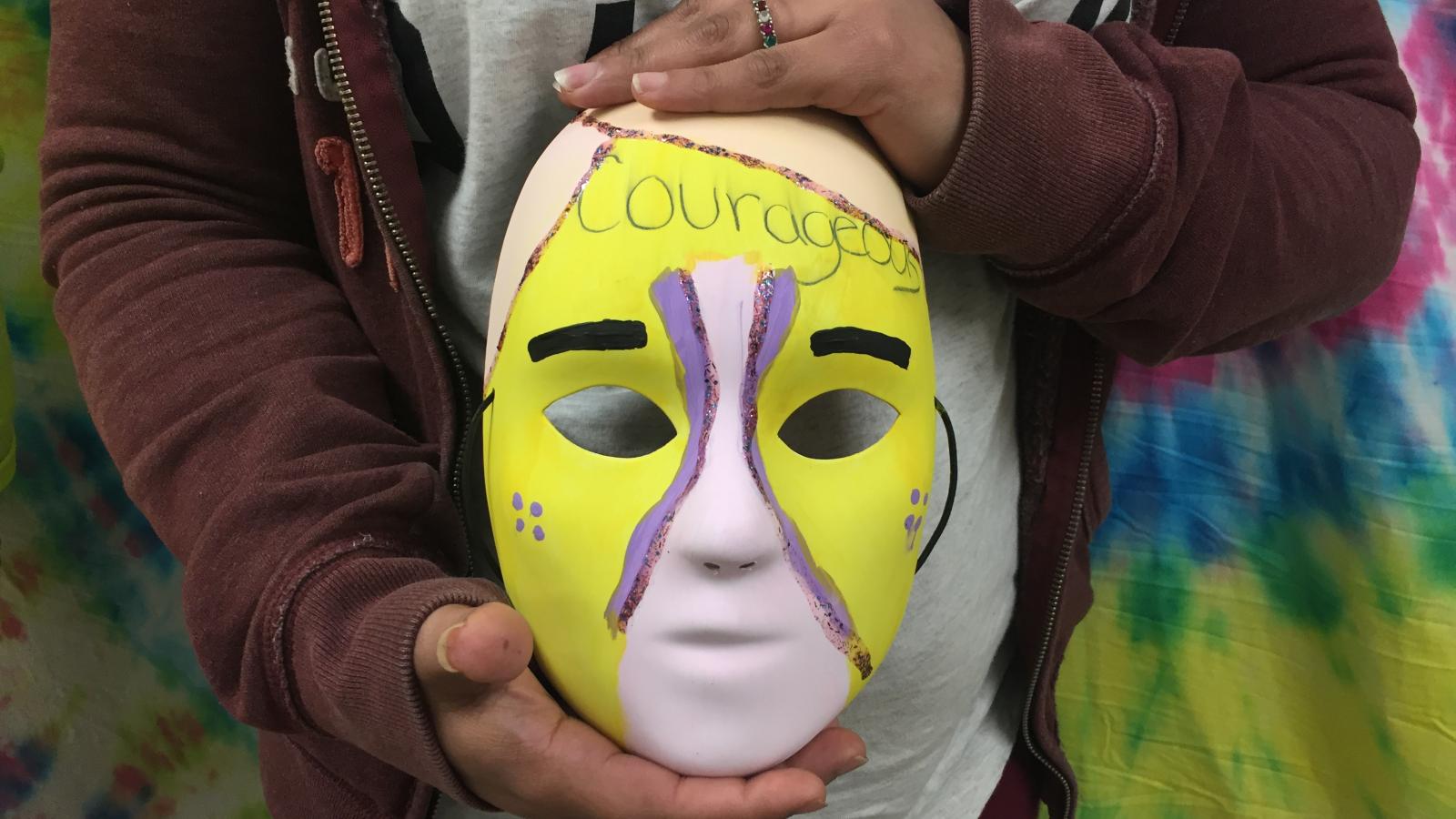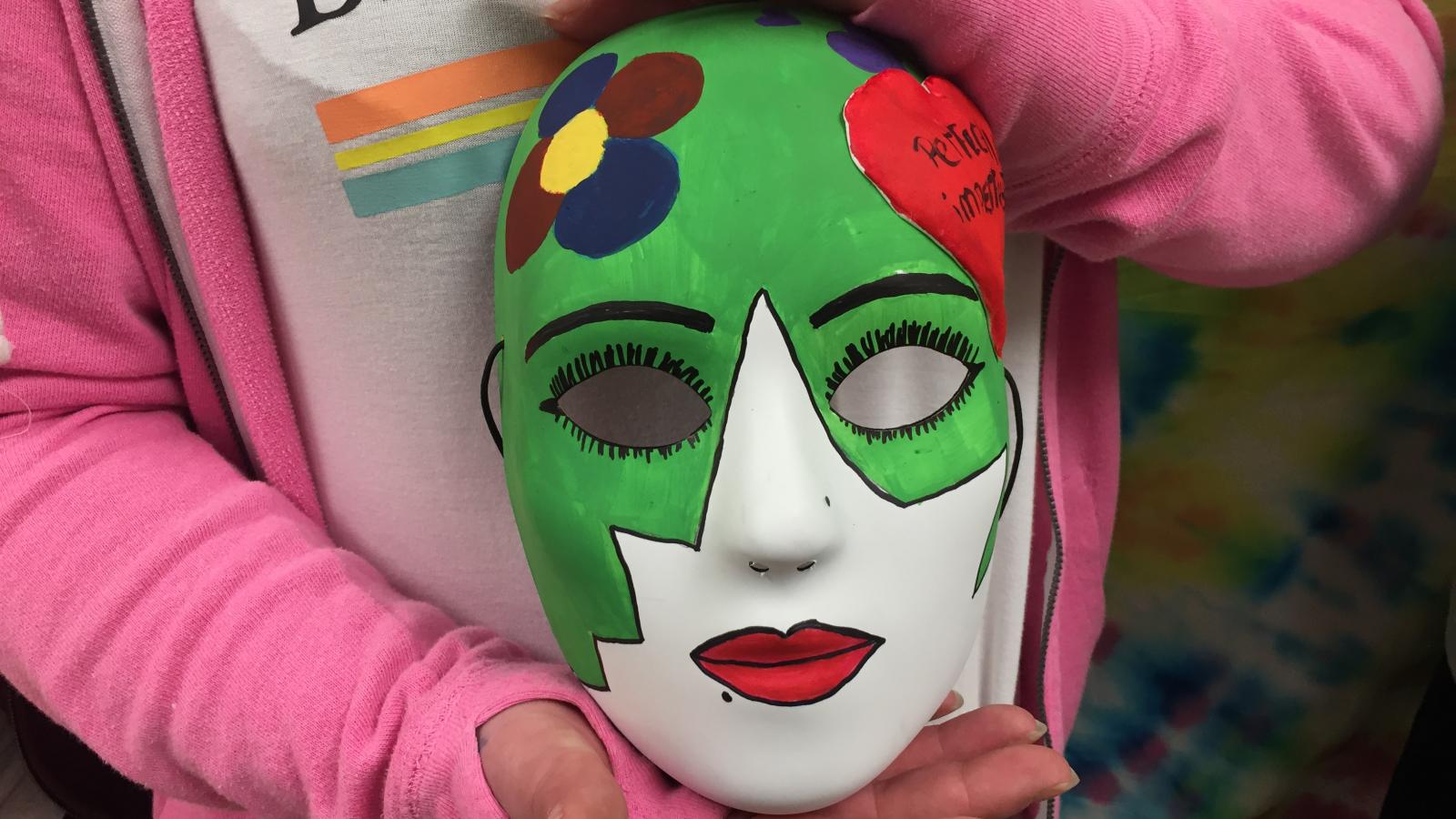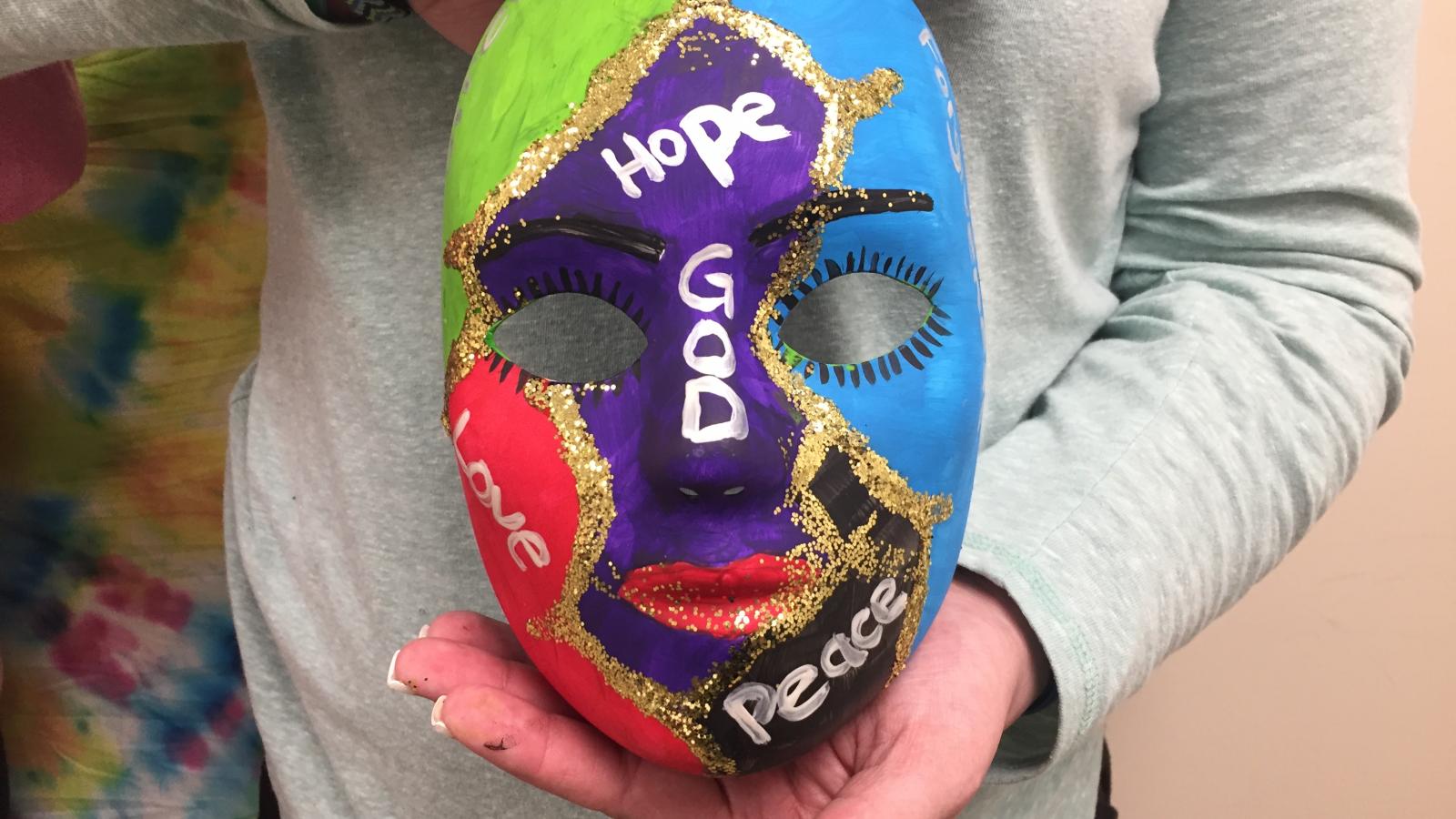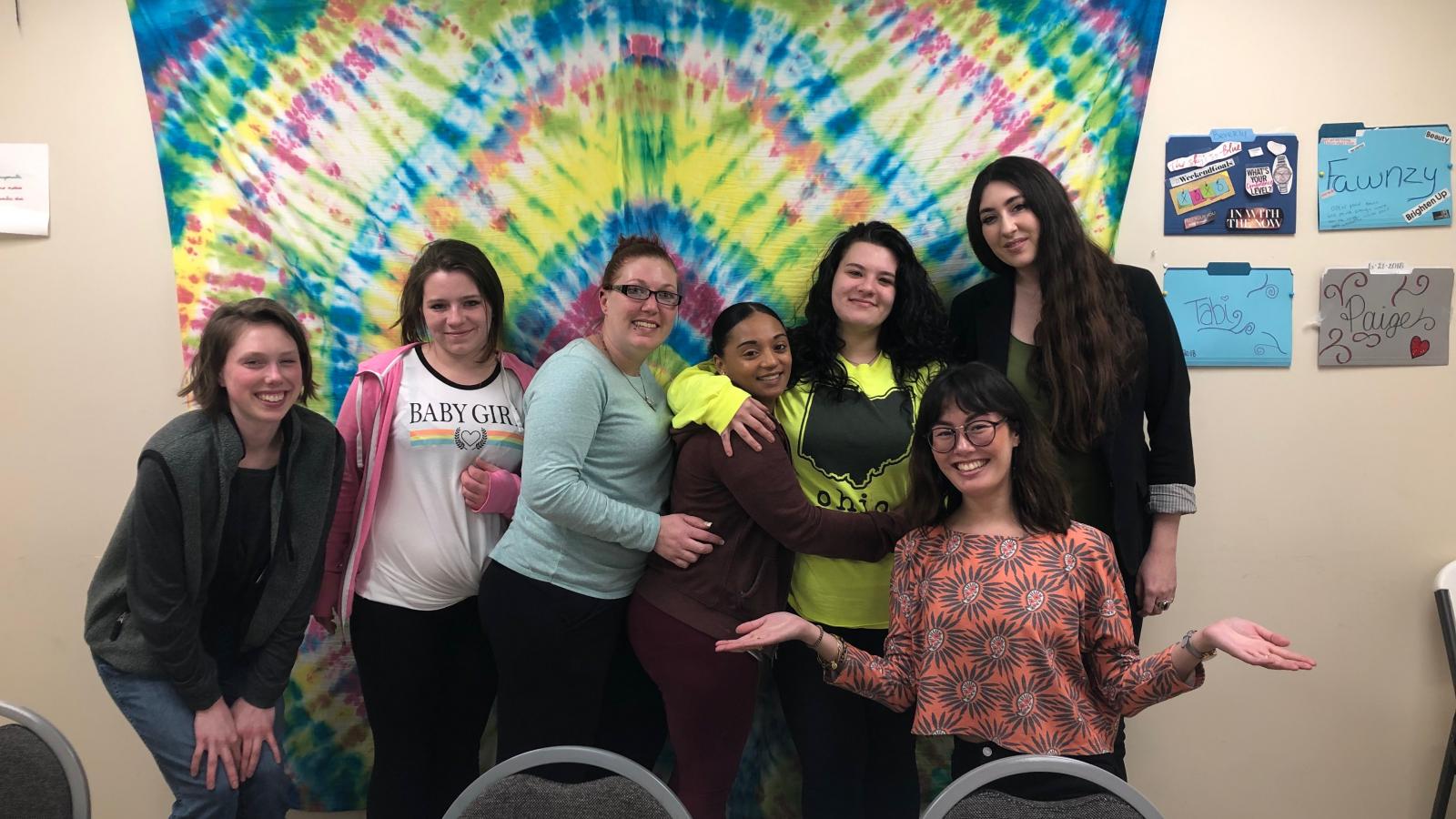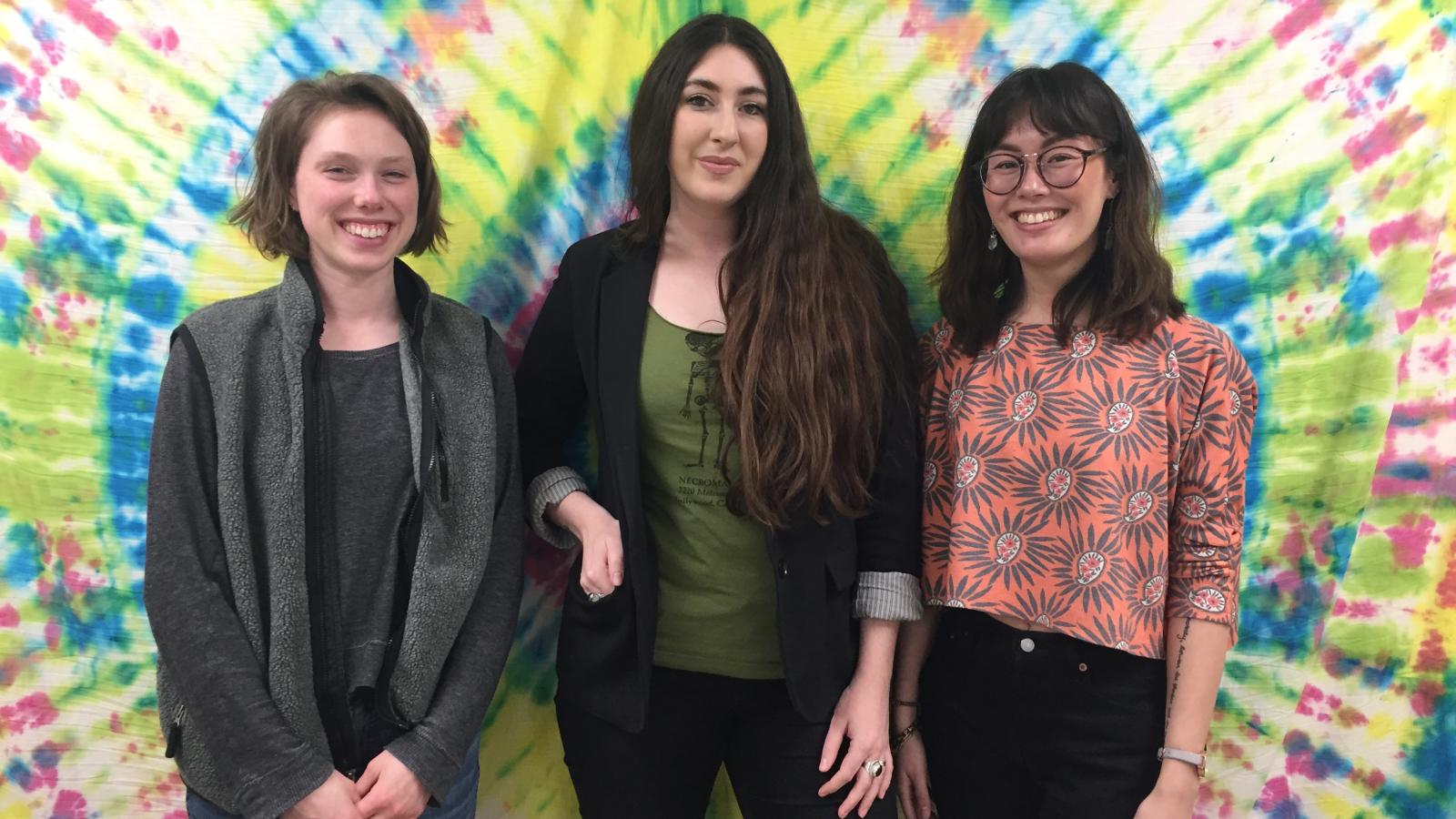The Masks We Wear; The Potential We See
Overview
For our public project, we are drawing on the concepts we learned from a group of 4–6 women (depending on the day) who volunteered to participate in a group art therapy session for 1 hour every day for 4 days. These women were in a transitional housing program, which means that they had to be at least 3 months clean (from their drugs of choice) and willing to cultivate values of self-love, self-esteem, and hope within themselves. Each woman shared her life story and other thoughts, experiences, and perspectives on her own drug addiction and drug addiction in general with us as they completed an art therapy project centered around masks. The art therapy session was designed to give the women an opportunity to create a mask in which the front would portray how they wanted the world to view them, and the inside of the mask would portray how the women saw themselves. We have provided photos of some of these masks above. We are eternally grateful to our friends Fawn, Kaylena, Liv, Paige, Tabi, and Tasha; to our friend and interviewee Elizabeth; to our interviewee Kayla, who is a counselor; and to our interviewee and coordinator Whitney, who is also a counselor. Thank you.
Five Takeaways:
1) “While drug addiction is bad, the people who suffer with addiction are not bad” (Fawn)
For all of the women we worked with, the dysfunctional life of addiction is how they grew up and all that they knew. While addiction itself is an unhealthy consumption, the people themselves are no different from anyone else; they are human. As one woman shared, “addiction took everything and left [her] emotionally and spiritually bankrupt” (Tasha).
2) “People suffering from drug addiction are not bad people trying to get good, but sick people trying to get well” (Liv)
When discussing the struggles of others I think it’s important to also acknowledge that we all struggle with something in one way or another. Even though it might not look the same for everyone, we all have afflictions.
3) Growing up, family life and situation didn’t allow for processing emotions
Most of the women we got to know first used with their parent(s). They all expressed rarely seeing anyone show vulnerability growing up and that strength was equivalent to being emotionless.
4) Unceasing desire to feel love and connection fuels addiction
In the women’s home life, the lack of a parental figure was a consistent theme. The parent was either absent or addicted, leaving the child with the constant pressure to try and earn their attention. Often, a connection with their parent was only achieved by using with the parent. In addition, drugs were used to fill a void and escape from emotions.
5) Intergenerational help
Grandparents were very influential on the women we worked with. Whether that was serving as a role model or stepping up and taking care of them or their children.
6) Resilience and perseverance – a message of hope
Throughout our time with the women the strength of program and the women was apparent. They have all come so far and worked painstakingly hard to be where they are today.
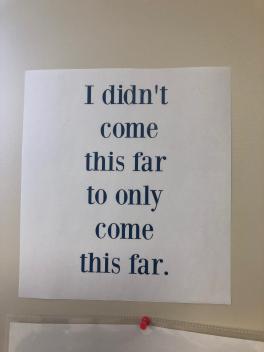
Personal Reflection:
I was initially interested in this project because of the art therapy aspect, as well as learning more about discourses and experiences surrounding drug use and recovery. I was not, however, prepared for how powerful and impactful the experience would be. The first day at our site catapulted me out of my comfort zone, as Katie and I actively listened to the challenging experiences the women we were working with had lived through. We began with introductions as the women gathered materials for their masks, and then dove right into discussing experiences such as abuse, self-harm, and over-dosing. It was not easy to hear how much pain the women had endured throughout their lives and required me to bear the discomfort in empathy rather than choosing to ignore my emotions, becoming detached from the situation. To navigate this, I had to acknowledge things in my own life that were being surfaced through the experience.
After the first day, going to the sessions was easier. We got to know the women more and developed respect and trust. They were all very encouraging and supportive of not only each other, but also of Katie and I. By the third session, we engaged in a discussion about religion and spirituality. I found this dialogue very interesting as they all had differing opinions, but could all agree on the importance of finding what works for each individual person. I learned a lot from our conversations with the women throughout the week; but what resonated with me so deeply was the prominent perseverance, resilience, and vulnerability of the women we had the privilege to get to know.
I don’t think I’ve ever been in a situation where a group of people were that real and authentic with me, explaining their struggles, experiences, and overall just being face to face with raw humanity. I couldn’t help but realize how connected I felt to these women even though I have never experienced addiction in my own life. I can’t even imagine going through half of the things these women have lived through. I was absolutely amazed by their willingness to open up to us: two random students they had just met. I was so inspired by how far they have come and their persistence and hope to live a better life.
My experience working with these strong women fully embodied the quote “As we learn about others, we learn about ourselves; as we learn about ourselves, we learn anew about others; and when we are open to what we learn about others and ourselves, we change.” (Elizabeth Campbell, Doing Ethnography Today). I left the week with an intense sense of appreciation and awe of the strength to open up, courage to allow yourself to process things, and the beauty of being vulnerable.
[Interview Clip: OFS(S)2019KMHH_Folsom-Lecouffe, Whitney_clip.wav]
A Brief History of the Recovery Council:
Community members in Ross and Pike counties founded the Recovery Council in 1977 in order to build better solutions and to better address the growing substance abuse issues in their county. According to the Recovery Council website, the program offers various services including: “in-patient care to women, out-patient care to men and women, transitional living programming for women, assistance with drug and alcohol addiction, other substance abuse treatment, mental health services, individual and group counseling, intensive outpatient programs, domestic violence counseling for men and women, life skill coaching, outreach services, educational groups, co-dependency counseling, parenting classes, anger management classes, drug testing, driver’s intervention programming, substance abuse assessment, substance abuse education, transportation services, and case management.” Haley and I were able to observe a specialized (and optional) women’s group, which was specifically designed for our community engagement project and focused on art therapy projects.
The Recovery Council mission statement is to “provide evidence based treatment services to the people of Pike County and surrounding areas, quality integrated AOD/Mental Health and alcohol and drug abuse/addiction treatment services which will include, but not limited to: Individual Counseling, Group Counseling, Case Management Services, Intensive Outpatient Services, Prevention Services, and Residential Services,” which reflects a varied and personalized approach to addiction.
Since 2011, the outpatient treatment services have been located in Waverly, Ohio, which is about an hour south of the Columbus area. This site is where Haley and I were able to connect with and learn from women who struggle with drug addiction in meaningful, lasting ways along with the help of Whitney Folsom. Currently, the Recovery Council offers a treatment schedule that includes group meetings twice a day Monday through Friday, a women’s program, case management, GED classes and preparation, a parenting program, and anger management programs. Transportation is also available for all clients. The Recovery Council focuses its sub-programs around hope and healing, as well as around promoting better self-esteem and self-value. These themes of hope definitely stood out as both influential and inspiring to the women with which we spoke.
Please consider donating, if you are able, to the Recovery Council in order to support those who are seeking help for their medical ailments: If you have any questions about donating daily needs items, please contact Sarah Gawelek at 740-222-1950. Questions about monetary donations can be answered by the Administration Office located at 14416 US Rt. 23, Waverly Ohio or by contacting Michelle Black at 740-947-6727.
The Future of Drug Rehabilitation Programs:
Although programs like the Recovery Council include an expansive array of crucial services to clients, they can benefit from more approaches, ideas, and avenues of support. For example, in our interview with Kayla, a counselor at the Recovery Council, we learned that transitional housing is the last step of the drug rehabilitation process. Kayla, who has years of experience and has overcome drug addiction herself, believes that another program should exist directly after transitional housing, which has women live together as roommates, work to save money, and attend sessions throughout the week—returning to their families and loved ones on the weekends. Kayla believes that more work can be done helping those who struggle with addiction to learn or practice crucial skills like balancing checkbooks, paying bills, and budgeting.
Additionally, only a set number of women (and men) are accepted into programs such as this because of set thresholds of capacity. There should be more programs in more counties in Ohio to start, and then within those programs there should be a wide range of services—ones that follow up with clients after they leave the programs as well. We should petition our local governments to fund more drug rehabilitation programs, expand these programs so they are able to support all those who struggle with addiction, do a better job reaching out to those who struggle with drug addiction, better educate our communities in order to break down stigmas of drug addiction, and decriminalize drug addiction as it is a serious medical problem. After our time participating and observing the art therapy women’s sessions, we can only encourage and hope for more programs like the Recovery Council as well as strive for more programs beyond transitional housing.
[Interview Clip: OFS(S)20190315HHKM_Havens,Kayla_clip.wav]
Personal Reflection:
Listening empathetically, without judgment, and responding honestly was the way Haley and I tried to engage with these women at first. As time went on, however, we became more and more comfortable with each other, eventually becoming accepted into the group entirely and started chatting and joking around together before, during, and after sessions. Throughout this session we were able to hear every woman’s life story from birth or early childhood until now, which was incredible and really telling of how much they trust us, have accepted us, and how far they have come in this program to be able to talk about it so freely and openly. Their life stories had a lot of relapses (however, many sought help multiple times, sincerely wanting to get better), drug use in emotionally difficult times, loss (a lot of their family members are also users and many have passed away), relationship strains (a lot of them between their grandparents and them or between their children and them, many of whom live with their grandparents now), and acceptance (that these things happened and that they are what they are).
A big milestone for me was when these women started asking Haley and I questions as well. As a researcher and student, unfortunately the power dynamic is too often shifted into the hands of people with academic knowledge production potential or people with academic or resource connections. The core of our project, however, is on these women as the experts or specialists when it comes to drug addiction issues; they are the authority, and we are the learners. The women asked us whether or not we have struggled with addiction or knew anyone/if anyone in our family has struggled with or struggles with addiction. They were wondering I think if we had seen firsthand someone we love going through this, which was an incredibly important question. How can we better understand if we have not seen drug addiction affect our loved ones—or ourselves—firsthand?
The conversations centered on parental and grandparental relationships and similarities, toxic masculinity and men not sharing their emotions, stigma attached to people who struggle with addiction, the connection between self-harm and addiction, and human trafficking. These women also really seemed to accept the oral historical approach combined with micro historical approaches, which places the emphasis on the histories of individual people as they see those histories themselves and rooted in a particular place or space and time. They believe that the media stigmatizes them by dehumanizing them and their experiences and not seeing addiction as a medical problem or “disease,” as they call it. They said that this disease doesn’t define who they are, although it has had a direct (and continuing) impact on their lives. At one point, they thanked us for being there because “not a lot of people would want to come here and listen to addicts about what it’s really like.”
What was most striking is that all of the women really accepted that they all have different ideas of faith, spirituality, and religion and that that is okay. I find this to be the strongest point of group therapy—that women with similar experiences or struggles can come together and support each other. In fact, throughout the whole time we were there, the women constantly gave words of affirmation “love you” and “I love your [self-harming] scars” and “you’re the best,” even just thank-you’s and expressing acceptance or forgiveness in various ways. Overall, this experience was incredibly inspiring, and I am floored by the strength, introspection, and hope that I saw in these women, who have also become my dear friends.
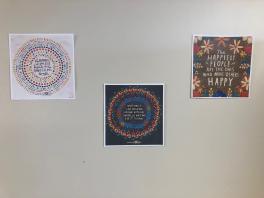
Interview with Elizabeth Rose Elrod:
While Haley and I were in Portsmouth, in addition to participant-observing an art therapy project with women who struggle with addiction, we were also able to befriend and connect with Elizabeth. Elizabeth is a founding member of the Portsmouth Pride Committee, talented poet, and Portsmouth community member. She holds leadership positions in The Portsmouth Welcoming Community, which created Portsmouth’s first Pride Festival (now an annual event), and considers herself a member of the LGBTQ+ community, as well as a member of the Transgender+ community. Furthermore, Elizabeth has overcome drug addiction herself and was kind enough to share with us her experiences and thoughts on drug addiction stigmas, changing the narratives of addiction, drug addiction in her community and in Appalachia in general, and mental health issues. Here are excerpts from her eloquent digital interview, which we believe is integral to our public project because people who struggle with drug addiction are and should be the authorities and because it also provides a platform for people who struggle with drug addiction to express their thoughts, perspectives, and experiences:
Katie: How has drug addiction shaped the community you grew up in or the lives of people you know?
Elizabeth: One night I was leaving my house for work and I saw an ambulance outside a house across the street from mine. I heard the neighbors say, “I hope it wasn’t another overdose.” When I got home the next morning there was an ambulance parked outside another house on the street, just one block down. Portsmouth has been ravaged by the opioid epidemic. When the doctors in Portsmouth started opening in-and-out pain clinics or “pill mills,” Portsmouth became addicted itself to opiates. Whenever those pill mills were shut down, the Mexican cartels stepped in and started delivering heroin door to door like a pizza delivery service. The town is struggling to keep its head afloat. It’s like the town has been hit with Narcan over and over again but keeps relapsing after each near disaster. Recovery communities and facilities have been popping up here and there all over Portsmouth and it was one of these outpatient facilities that kept me clean. But, with Appalachia, people don’t want to receive mental health treatment because of the stigmas surrounding mental health and addiction.
Katie: How do you help clients get to the point where they can accept their experiences, struggles, themselves and then move towards a healthy future undefined by their addiction?
Elizabeth: I believe every person and every addiction story is different. Many addicts aren’t ready to admit their faults and ask for help. I truly think the best way you can help clients achieve an active recovery is to provide them with many tools to achieve recovery. I wasn’t ready to get clean when I first got sober, but when I tried again, the tools I was provided in my first rehab are what helped to keep me clean. It’s like raising a child. You try to provide them with everything they need and when it’s time to let them be on your own, you let them and hope for the best that they know that: a) they can come back if they ever need to, and b) that you provided them with the tools to survive on their own.
Katie: Why do you think there are so many stigmas? Or why do you think Americans, the media, politicians, law-makers, etc. insist on dehumanizing people struggling with drug addiction?
Elizabeth: I think a lot of the stigmas surrounding addiction were a result of Nixon’s “War on Drugs.” There was a lot of misinformation being spread during that time that dehumanized the people facing addiction. I think the dehumanization of drug addicts makes people feel elite. I think it gives some non-addicts a pedestal to place themselves on because, in their mind, they didn’t choose to become an addict and they believe those who are addicts chose that lifestyle.
Katie: How can we break down the stigmas surrounding addiction?
Elizabeth: I think the best way to break down stigmas surrounding addiction is to educate the public and through word of mouth. People don’t trust the media nowadays (especially in Appalachia) and often all it takes is a one on one conversation with someone who believes the stigmas.
Katie: How should people (students, young, old, of all professions) talk about addiction?
Elizabeth: I believe people need to talk about addiction with an open mind and as empathetically as possible. People can be very elitist about addiction and the “choice or disease” argument.
Katie: What advice would you give to students like us in thinking about issues of addiction?
Elizabeth: I would ask that you don’t make assumptions about those who are currently in the throngs of addiction and those of use who are recovering.
Elizabeth also shared with us a very powerful poem that vividly expresses her experiences overcoming her drug addiction. We now share her words with you in the hope that it will allow for a better understanding of addiction as an experience, a medical issue, and not as the person themselves, of which there is so much more. Without further ado:
“Cycle,” by Elizabeth Rose Elrod:
Again,
I wake up in a cold sweat,
The shame covers me,
The fear that I've lost it all.
Again,
My heart palpitates in a syncopated frenzy,
My eyes strain for tears,
My skin crawling with revulsion,
Again,
I sit up and I glance around the room,
I search for the incriminating evidence,
The pipe, the baggie, the lighter,
Again,
I find nothing.
I sit back down.
I gaze outside my window.
172 days.
6 months of therapy.
I feel gratitude.
I feel accomplished.
When I look at the rising sun,
I see my new beginnings.
I find some inner peace.
But I must stay wary--for I know the night will come:
Again.
Resources
Finally, we offer up a comprehensive list of online resources for those struggling with addiction and looking for help, for concerned families and friends, and for the general public. You are not alone.
Fieldworkers
Haley Hinger
Katie Mooney
Community Partner
Whitney Folsom

